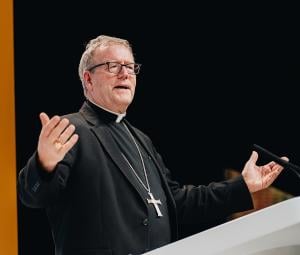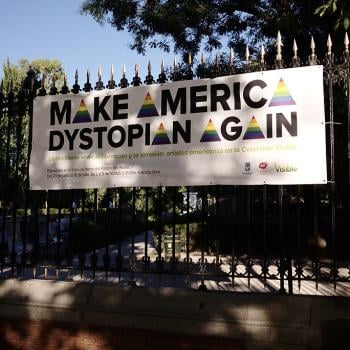
I am concerned about the relative silence the United States Catholic Bishops concerning all the human rights abuses of the Trump administration. Yes, they might speak, briefly, about protecting migrants, or concerns about the way the defunding of USAID has affected their ability to help those in need, but in general, the way they talk about these issues is far different from the way they have talked (and continue to talk about) culture war issues in the United States. We hear far more concern about school sports than we do about all the federal workers unjustly losing their jobs, being put on the job market, and being told they must find a job (and fast) if they want health care (because the Trump administration with the GOP plan to make work requirements a must for Medicaid). Many of those who have been fired are elderly, who would, in better times, find it difficult to find someone willing to hire them, but now, with mass unemployment (due to the federal layoffs, as well as many companies having to layoff workers due to the economic uncertainty the Trump administration has created), will they be able to find a proper job? How many of them will end up homeless or die due to their new situation? The United States Conference of Catholic Bishops, the USCCB, should be focusing on this (and other similar concerns) instead of what is happening with school sports.
The relative silence concerning other insidious actions of the Trump administration, where, at best, they give a statement of concern, but sometimes a mixed one where they try to find some good in the evil which Trump has done, can be seen as a sign that many within the USCCB are complicit with and support what the Trump administration is doing. After all, Bishop Robert Barron himself complained about protests happening in Trump’s joint session with Congress, saying it was an insult to the “liturgy of democracy,” without showing any concern with what Trump was saying or doing (including, just before the session, the statement Trump made saying long live the king!). It is not as if such protests have never happened before; both Biden and Obama were heckled when giving their State of the Union speeches, and I do not remember Barron being concerned about those hecklers insulting the “liturgy of democracy.” Why? I can’t help but think it is because he is not concerned with what Trump is doing, as Trump supports the culture war concerns Barron has (for now), while Barron thought Biden and Obama were his culture war enemies. I fear Barron represents the majority of the clergy in the United States. They want to continue the culture war efforts, having their efforts focused on side concerns (like the state of high school athletics) instead of dealing with the real threat which lies before us.
I remember when Barron was first making waves on the internet. I didn’t find much of what he had to say was of value to me. It was all relatively basic, albeit neatly packaged. I thought he might have been doing some good helping people learn some basics of the faith. As such, I didn’t pay much attention to him. I did notice a few (“traditional”) Catholics criticized him as being liberal because he dared acknowledge Balthasar’s hope that all might be saved. But in general, he seemed relatively moderate (if a bit conservative leaning), and so, I did not see him becoming a major player in the culture wars at the time. At that time, I was one of many writing for the group blog. Vox Nova, and while I did not have much to say about him, I do remember one of the conversations I had with a co-blogger and friend of mine, Michael Iafrate. Michael indicated that we should pay attention not just to what Barron said, but what he didn’t say, the issues which he avoided: that is, social justice concerns. Michael indicated that Barron’s actions (or lack thereof) dealing with the expectations of social justice indicated far more about him and his ideologies than his presentations on basic dogmatic concerns (or his commentary on various literary interests, which he often used to get people to pay attention to him and what he had to say). Michael was not giving an argument from silence, but rather, he was following a general principle, the kind which St. Thomas More is often associated with, that is, silence (from a person in power or authority) indicates consent. Barron’s silence concerning what the Trump administration is doing, therefore, follows his silence concerning social justice concerns. What Michael said stuck with me, and so, over time, I got to see how insightful it was, as Barron slowly went away from silence, to engaging the culture wars, joining side by side with extreme figures coming from the right, and in doing so, attacking social justice concerns, calling those who promoted them as being “woke” and liberal. Barron uses such ad hominems to deal with his critics, demonstrating, from his words, and his actions, his contempt for social justice, and his willingness to attack anyone expecting its promotion in Catholicism by using secular, right-wing catchphrases, thinking those ad hominems serve as a proper response to their concerns.
Barron, however, is not alone. The silence concerning social justice, and its expectations in society, has become a norm for clergy in the United States. Yes, there are good clergy who go against that norm, who fight for social justice, who do as they should be doing, properly pastoring their flocks to deal with the times we are in. But, for the most part, this is not the norm. And so, when the Trump administration demonstrates no care or concern for law, order, the common good, human dignity, human rights, the elderly, the poor, veterans, women, non-white Americans, the lives of those who are LGBTQ, the climate, federal workers, national sovereignties (Canada, Greenland, Panama, et. al), and the like, Catholics are not being encouraged to resist Trump and fix the problems he is creating. Trump is destroying all the basic functions of the government, laying off federal workers from those departments which he cannot outright close down, so that those who are left will be over worked and ineffective; once this happens, then we should expect more calls to privatize the functions of government, from the postal service, to Medicare, turning goods and services the government should perform for the common good (without expectation for profit) into goods and services which are bought and sold for profit (instead of the common good). It is easy to see what will come of this: people will not be able to obtain basic needs, and either, will needlessly suffer in extreme poverty or die; where are the Catholic clergy as this happens? It is easy to believe, due to their relative silence, indeed, complicity with what Trump is doing, many Catholics will have a crisis of faith, with many of them stop going to church as long as the clergy prop up the Trump administration, and others giving up their faith altogether. Those who do remain will, for the most part, have to rely upon voices outside of the United States, like that of the Pope, to give them the inspiration they need to continue on in their faith.
The situation on the ground is dire. Not everyone can do everything. The clergy can argue that they are not meant to be activists, which is why they are not doing much. Why, however, do they not say the same thing when dealing with culture war concerns? Their silence is madness. Their silence is deafening. They don’t have to be out in the streets (though they can be); it would be a start if they actually talked about the dire situation, warned of the evil going on, and encouraged Catholics to do all they can to stop it, Pope Francis, even when sick, has done this, so why can’t they? I am saddened and appalled by what I see happening in the United States, not just by the Trump administration, but by the Catholic clergy. But I am thankful that there are some who are standing up and speaking out. I am thankful for the few. They are the light which we need in this present darkness.
* This Is Part XLIX Of My Personal Reflections And Speculations Series
Stay in touch! Like A Little Bit of Nothing on Facebook.
If you liked what you read, please consider sharing it with your friends and family!
N.B.: While I read comments to moderate them, I rarely respond to them. If I don’t respond to your comment directly, don’t assume I am unthankful for it. I appreciate it. But I want readers to feel free to ask questions, and hopefully, dialogue with each other. I have shared what I wanted to say, though some responses will get a brief reply by me, or, if I find it interesting and something I can engage fully, as the foundation for another post. I have had many posts inspired or improved upon thanks to my readers.
















